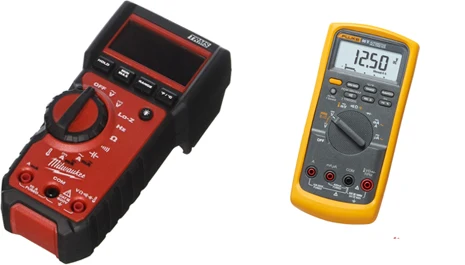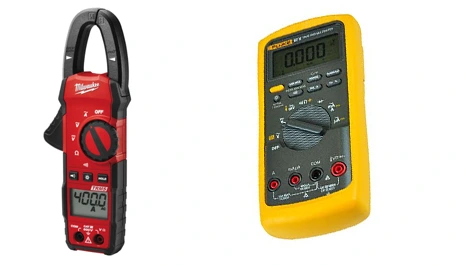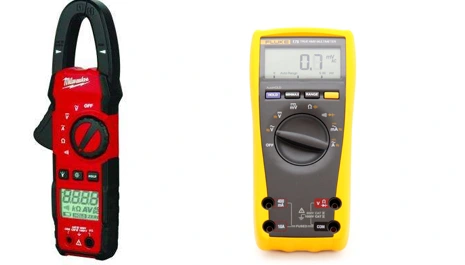Last Updated on January 21, 2023
A Milwaukee multimeter is an electrical measuring instrument that can measure voltage, current, and continuity. A multimeter can test a circuit for faults or see if it contains any live parts. Multimeters come in many varieties, but the two most common are digital and analog ones.
On the other hand, a fluke multimeter is a type of digital multimeter that is used for electrical and electronic testing. It is a hand-held device that can measure voltage, current, and resistance. In this article, we are going to compare Milwaukee multimeter vs fluke.
The Difference between a Milwaukee Multimeter Vs Fluke Multimeter

When choosing a best multimeter, you need to consider your needs and budget. If you are just starting out with electronics or electrical repairs, then a Milwaukee multimeter would be a good choice. They are relatively affordable and have a wide range of features.
However, if you are a professional or need more advanced features, then you would need to invest in a fluke meter. In this section, we will focus on the most important differences between Milwaukee and Fluke multimeters.
Accuracy: One of the most important factors to consider when choosing a multimeter is accuracy. A Milwaukee multimeter is usually more accurate than a Fluke multimeter. This is because they have better calibration and are less likely to produce false readings.
Features: A Milwaukee multimeter comes with a wide range of features, while a Fluke meter typically has fewer features. If you need a multimeter with lots of bells and whistles, then a Milwaukee is the better choice.
Durability: As a general rule, Milwaukee multimeters are more durable than Fluke multimeters. This is because they are built to withstand tougher conditions.
Ease of Use: It is usually easier to use a Milwaukee multimeter than a Fluke multimeter. They have simpler menus and are less likely to have confusing buttons.
Safety: The safety features of a Milwaukee multimeter are typically superior to those of a Fluke multimeter. This is because they are designed for use in hazardous areas.
Measurement: With a Milwaukee multimeter, a wider range of parameters can be measured than with a Fluke multimeter. This includes frequency, capacitance, and temperature.
Temperature: Temperature can be measured by a Fluke multimeter, but not by a Milwaukee multimeter. This may be important if you need to measure the temperature of an object or circuit.
Warranty: Milwaukee multimeters come with a longer warranty than Fluke multimeters. This is because they are made to last longer.
Similarities between Milwaukee Multimeter Vs Fluke Multimeter

Despite the differences between Milwaukee and Fluke multimeters, there are some similarities.
- Both multimeters are digital: This means that they both use electronic circuits to measure parameters.
- They both have a wide range of measurements: This includes DC voltage, current, resistance, and capacitance.
- Both are portable: This makes them easy to carry around and use in different locations.
- Each has a backlight: This makes them easy to read in low light conditions.
- Both of them are durable: This means that they can withstand rough treatment and are unlikely to break easily.
How to Use a Multimeter
Now that you know the difference between Milwaukee and Fluke multimeters, let’s take a look at how to use a multimeter.
To use a multimeter, you first need to connect the probes. The red probe goes on the positive terminal of the device you are testing, and the black probe goes on the negative terminal. Once the probes are connected, you can select the measurement you want to make. To do this, press the mode button until the desired measurement is displayed.
Then, you need to set the value. This is usually done by turning a knob or pressing buttons. Finally, you need to connect the multimeter to the device you are testing. To do this, hold the probes against the terminals of the device. Make sure that the black probe is connected to the negative terminal, and the red probe is connected to the positive terminal. If you are not sure which terminals are positive and negative, consult the manual of the device you are testing.
Which Multimeter is Right for You?

If you are a professional or need a more advanced multimeter, then a Fluke multimeter is the better choice. Regardless of which multimeter you choose, make sure to read the instructions carefully and use caution when using it.
Never exceed the maximum voltage or current rating, and always disconnect the power when not in use. With proper care, both Milwaukee and Fluke multimeters can provide you with many years of reliable service.
However, Fluke multimeters have the advantage when it comes to temperature measurement. Which multimeter is right for you depends on your needs and preferences. With proper care, both Milwaukee and Fluke multimeters can provide you with many years of reliable service.
FAQs
How Do I Determine Which Fluke Multimeter I Need?
The best way to determine which Fluke Multimeter is right for you is to read the product descriptions and reviews. You can also compare the features of different Fluke multimeters to see which one meets your needs.
Can I Use a Milwaukee Multimeter for Professional Work?
Milwaukee multimeters are great for hobbyists or home use, but they are not as advanced as Fluke multimeters and may not be suitable for professional work.
Is the Fluke Multimeter Difficult To Use?
No, the Fluke Multimeter is not difficult to use. It has a simple interface and easy-to-follow instructions. However, it is important to read the instructions carefully and use caution when using the multimeter.
What Features Do I Need On My Fluke Multimeter?
The features you need on your Fluke multimeter depend on what type of work you do. If you are a professional, you may need a more advanced multimeter with more features. If you are a beginner or need a multimeter with lots of features, then a Milwaukee multimeter is the better choice.
Final Thoughts
The best solution for you depends on whether or not you are a professional and what your preferences are. Milwaukee multimeters cost less, have more features, and may be easier to use than Fluke multimeters. If money is an issue, then the Milwaukee Multimeter might be right for you. However, if advanced options are important to you like temperature measurement, continuity testing, and live circuit diagnosis, then the Fluke Multimeter is the better choice. In the end, it all depends on what you are looking for.



